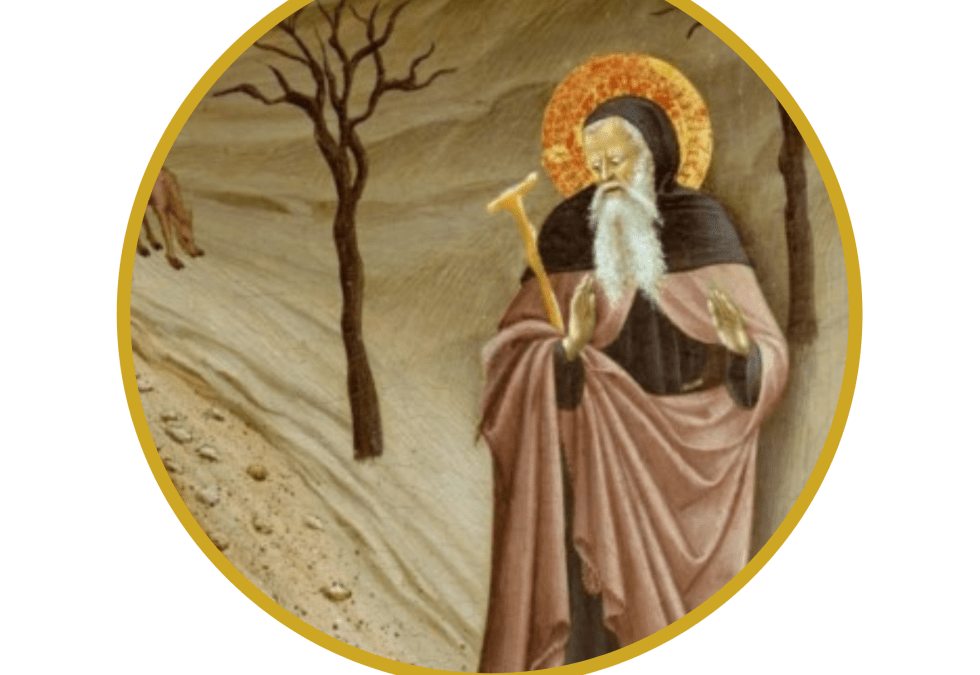17 January: Feast of Saint Anthony. Known as Saint Anthony “the Great” and the “Father of Monks”, he was born in Egypt around the year 250 to distinguished parents. After their untimely deaths, he dedicated himself wholly to acts of mortification. One day in church (around age 18) he heard the words of the Gospel: “If you wish to be perfect, go, sell what you have, and give it to the poor” (Matt. 19:21). Anthony felt as if Christ had spoken to him personally, giving a command he must obey. Without delay he sold his property, gave the proceeds to the poor, and went into the desert. He chose an inaccessible place in the wilderness where he dedicated his life to God in manual work and continual prayer. He lived in solitude for over 20 years. His bed was the hard ground. He fasted rigorously, ate only bread and salt, and drank only water. He would not take food before sundown; at times he passed two days without any nourishment. He often spent whole nights in prayer. In his older age, he imparted wisdom to a group of disciples and encouraged them to lead a monastic life. Because he was the first Christian to retire to a monastic life, he is considered to be the first monk and also the father of all monks. Anthony suffered repeatedly from diabolical attacks, but these merely made him more steadfast in virtue. He would encourage his disciples in their struggle with the devil with such words: “Believe me; the devil fears the vigils of pious souls, and their fastings, their voluntary poverty, their loving compassion, their humility, but most of all their ardent love of Christ our Lord. As soon as he sees the sign of the Cross, he flees in terror.” He died in 356 on Mount Kolzin by the Red Sea, at the age of 105. A year later his friend, the fearless bishop and confessor St. Athanasius, wrote his biography, which for centuries became the classic handbook of ascetics. He describes how St. Anthony saw the purpose of asceticism as not to destroy the body but to bring it into subjection, re-establishing man’s original harmonious integrity, his true God-given nature: “His was a perfectly purified soul: no pain could annoy him, no pleasure bind him. In him was neither laughter nor sadness. The sight of the crowd did not trouble him, and the warm greetings of so many men did not move him. In a word, he was thoroughly immune to the vanities of the world, like a man unswervingly governed by reason, established in inner peace and harmony.”
Saint Anthony famously taught his monks: “Let it be your supreme and common purpose not to grow weary in the work you have begun, and in time of trial and affliction not to lose courage and say: Oh, how long already have we been mortifying ourselves! Rather, we should daily begin anew and constantly increase our fervor… And that we may not become weary and disheartened, it is good to meditate on the words of the apostle: ‘I die daily.’ If we live with the picture of death always before our eyes, we will not sin… For our life is by nature uncertain and is daily meted out to us by Providence. If we are convinced of this and live each day as the apostle suggests, then we will not fall into sin; no desire will enslave us, no anger move us, no treasure bind us to earth; we will await death with unfettered hearts.”
Ideas for celebrating this feast at home:
- For dinner, make “St. Anthony of the Desert Soup” – recipe at this link.
- Read Athanasius’ accountof St. Anthony.
- Learn more about Western Monasticism.
- Pray for those in monastic life and pray for a resurgence of vocations to this life.
- As a family, pray to St. Anthony for vigilance in the fight against temptations and sin.
- Make a sacrifice or mortification on behalf of someone in need of Christ’s mercy or healing.
(Sources: exerpts from The Church’s Year of Grace by Pius Parsch; catholicculture.org)

Recent Comments